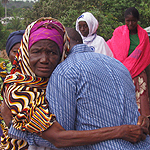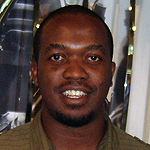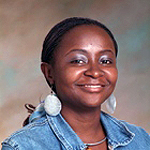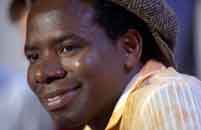
African writers introduce their special places in our
introspective column on emotional geography. In
this issue, Liberian novelist,
Vamba Sherif returns
to his hometown after two decades and a civil war
I was returning home after twenty years, and the man who was driving me there turned out to be an ex-rebel. The last time I saw Kolahun, my birthplace in Liberia, was in 1990, and now in March 2010, I was bound for it again. I had arrived in Monrovia from the Netherlands the day before, apprehensive of the journey because of the horrific stories of people who had undertaken such trips and had died of poisons mixed into their food. After the civil war, poison had replaced bullets, and the enemy was omnipresent. I had lodged at my elder brother’s, who had taken more than thirty family members into his care, mostly youngsters whose parents had not survived the war. The night was restless: church songs, drums and rattles rent its air, the city having turned into a noisy marketplace of God-seekers.
The driver came to pick up me at dawn, and as protection against unforeseen circumstances, I decided to take some of my cousins with me as guards. We loaded the jeep with bags of rice and other foodstuffs for the family. By the time the city awoke, we were far beyond its borders. The driver was good. I marveled at how he skillfully avoided the potholes that littered the roads, and when I commented on this, he said without hesitation: ‘I was a driver for a rebel faction during the war.’ He was sturdy like a wrestler, bowlegged, and with bloodshot eyes, and he wore a cap and winter boots in a heat that had denied me sleep. The revelation numbed me; I was sitting beside a man who had actually participated in the war, who had probably killed. The war in which he had participated began in 1989 with a rebel group, led by Charles Taylor, whose aim was to oust the then president Samuel Doe, who had come to power in a bloody coup in 1980. But the Liberian civil war began even much earlier, during the founding of the country, when freed black slaves from America returned in 1822 to Africa to found a new republic based of liberty. They called the land Liberia, from the Latin word libre, for free. But the founders were at odds with the ethnic groups that thrived along the coast of Liberia and in the interior. The inability on both parts to create a balanced society, in which discrimination played no role, led to the coup in 1980 and then to the civil war in 1989.
My driver pulled over at a restaurant on the roadside in a dust-swathed town, where the asphalt petered out into dusty roads. ‘Just imagine, Chief,’ my driver was telling me, as we stuffed ourselves on rice and a sauce of cassava leaves and smoked fish soaked in palm-oil. I was uncomfortable with the ‘chief’ title, for he was employing it either to mock me or to emphasize our difference, putting me on a pedestal on which I did not belong. ‘I would be speeding at two hundred kilometers per hour in a jeep without windshield, my head just below the steering wheel, for fear a sniper might snatch it off. At the back of the jeep would be a fighter with a machinegun, letting loose his fury on everything that crossed our path. The mission would be to drive right into the heart of enemy territory, and fire a few rounds of bazookas before returning to the base.’ As I listened to him, it struck me that he must have been in his teens when he made those sorties. ‘We won the war, Chief,’ he told me.
But at what cost, I wondered, thinking of my mother.
She had died when the north was cordoned off from the rest of Liberia by one rebel group, to which my driver belonged, fighting another group for control over that territory. I was told that she had taken ill and had died for lack of medicine, but a week later someone claimed to have seen her in a refugee camp in Guinea. This fact would prove baseless; she had indeed passed on. But I was left with questions as to how she had actually died. In subsequent years, I attempted to visit her grave but was hampered by reports of war, by the terrible condition of the roads which, during rainy seasons, was impossible to travel, and by lack of adequate funds.
Once we took to the road again, dust settled in the car, impeding breath and sometimes blinding us. Flanking the road toward the north were forests, dense, perpetual and mysterious, the greenest of the green, crowning mountains and spreading like a canopy over the earth. Towns and villages emerged before us, some abandoned, others sparsely crowded, but always with beautiful flame trees, which my eyes would caress, as if I were seeing them for the first time; and always with people trading coal, vegetables or bushmeat along the roads.
We arrived at Kolahun just before nightfall. Its suburbs were cluttered with houses so dilapidated that I could not imagine human beings inhabiting them. At the heart of the city, I saw a building that I recognized, a two-story building that once belonged to a Lebanese nicknamed ‘Old Man Baldhead.’ Kolahun was ingenious at nicknames. Its best footballer was called ‘The Broom,’ because he swept everything in his path with his bare feet, player, ball and all. And the boy who torched a box in which his friend was hiding was named ‘Foday, The Torturer,’ which stuck so well that when I met him, now old and wise, he was still called, ‘The Torturer,’ but always behind his back.
The Lebanese’s building was bullet-ridden, bare of paint, like most houses around it. The main thoroughfare, where girls fried fish and donuts at night to sell to lovers, appeared narrower than I recalled, the shops that once flanked it, including the gas station where checkers often gathered to insult each other, gone. On that road, as a teenager, I had found my calling as a writer. I would compose love letters for men, which I would carry to women who could not read them and would tuck them into their wrappers, making the men wait for months for a reply because it was all part of the courting game.
My heart was thudding with excitement as we turned the corner towards home. The family was standing in a small group, consisting mostly of women and children, the remnants of what was once the largest family in Kolahun. As the women hugged me, I could smell firewood on them, the dust of pounded rice, and the food they were preparing. I held them tight, reluctant to let go, and after it was over I paused to take in the compound.
Some of the houses, including my mother’s, were gone; so were the mango trees whose fruits I had climbed as a child to pick. But my father’s house was still standing. I entered it now in search of a room into which I would steal every day as a child, without my parent’s knowledge, to read some of the thousands of books that filled it, including Arabic manuscripts written by my ancestors. In that room, in the sharp light streaming from cracks in the window, I learned Sufism, and wrestled with secret formulas thought to make a man rich or miserable, or distend the stomach of a barren woman with child. One of my uncles had sounded the alarm. ‘That child has been reading books that only adults past their forties should read,’ he had cried. My action had caused such a scandal that my mother and I were almost forced to leave the house. She was accused of encouraging me to gain access to secrets that would make her wealthier. The room was empty now. ‘The books were burned by rebels,’ an aunt told me. It was my greatest loss, besides my mother’s death.
I longed to visit her grave now, but because she was buried in a nearby town, Massabolahun, I had to wait until the town was ready to receive me. In the house allocated to me, I placed a few cousins in one room, a number of them in the other, all tested in the war, all prepared to protect me from anyone still reeling from the trauma of war. ‘Chief, I will sleep in the jeep in front of the house,’ the driver said, ‘No one will dare face me.’ My fear was unfounded, but I did not sleep out of excitement.
Hundreds crowded the road to receive me the next morning in Massabolahun, all singing a solemn song tinged with joy, but on arriving at the graveside, silence fell on the crowd. The grass around the grave had been trimmed and a hedge of bamboo enclosed it. Standing there, I remembered my mother’s shimmering dark skin, the sight of her, so tall and dark, as she emerged from her house in colorful wrappers and a proud headgear to lead her apprentices to the local market where she reigned supreme. The Lomas, a people who had co-existed with us for centuries but who were now at war with us even after the war had ended, had nicknamed her, ‘The Beautiful Mandingo.’
Now she was no more.
Seven cows were slaughtered as offering, and I was asked to say a few words. The words took shape in my mind but choked in my throat. The crowd burst into tears. A town elder stood up. ‘Your mother’s beauty was out of this world,’ he said. ‘Her skin was so smooth, the beauty curves in her neck so pronounced that people would pause to gape at her.’ I believed him, believed even the most embellished of the stories told that day.
With the ceremony over, I spent days commuting between Massabolahun and Kolahun, visiting elders and childhood friends, and listening to their wartime stories. The ease with which they told of the horrors of the war astounded me. ‘A rebel commander caught your mother,’ the town chief of Massabolahun told me, ‘and believe me, Sherif, for I was there when it happened. He fired a whole round at her and not a single bullet touched her. Yours is a unique family. It was not a bullet that killed your mother, but illness.’ I did not believe him. In this anecdote, rendered so beautifully, lay the stark truth. My mother was killed by a rebel. In a tradition where truth takes on many forms, I had been spared the pain of the hard truth by another, less painful truth. In subsequent days, I learned to live with that truth.
When not with the elders, I whiled away my time at the Kaihah river in Kolahun where I had learned to swim. That part of the river which had once sizzled with life was now shrouded in bushes, and the first time I went to see it I had to cut my way to it with a cutlass. My father’s school, built after his return from Egypt, was located on the way to the river. It was now named after someone else, all traces of the man who had built it, gone. Childhood friends, whose faces I recognized but not their names, poured daily into the compound to share the past with me. However, I noticed some reluctance on their part when evoking that past, as if they were trying to consign it to where it belonged and to concentrate on the present. But how could I do that if a great part of my profession involved evoking the past?
The longer I stayed in Kolahun, the more I longed for my books, for the ritual of waking up in the early hours to write, and for my life in my new home. Leaving Kolahun, I began to long for it even while I was still within its borders. I was a man torn between two worlds. 
Copyright
© African Writing Ltd & respective copyright
owners. Enquiries to permissions(at)african-writing.com.
![]()










